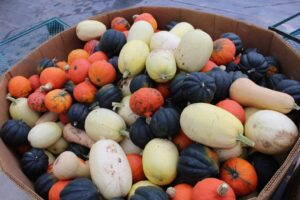Organic Hard-skin “Winter” Squash
Season: September to December in Northern California, but available year round.
Flavor: There are so many shapes, colors and sizes of winter squash that it’s a real treat to see them start to show up at the market each fall. Winter squash specifically refers to a wide variety of squash species that have matured long enough so that their skin is hard and their seeds are larger and tougher to eat than Summer Squash.
Storage: The best way to store winter squash is in a cool, dark and dry spot, where it will hold up for at least a month, even longer depending on the variety and if your storage space is well ventilated. Store cut squash in a tightly covered container and refrigerate for up to five days. You can also freeze raw squash for up to 6 months; cube first, then freeze in a single layer on a rimmed sheet tray and transfer to a freezer-safe container once frozen.
How to use: What can’t you do with winter squash? It’s wonderful roasted, stuffed, and pureed.
Thin-skinned cultivars like delicata squash cook quickly and are great combined with other vegetables or served as a side dish on their own. The skin can be eaten!
Nutrition: That beautiful orange and yellow flesh is the source of uber-powerful disease-fighting antioxidants that protect against cataracts and stroke, for starters. It’s rich in Vitamin A, B-6, C, potassium and fiber, for starters, and some heart-healthy omega-3 fatty acids as well.


